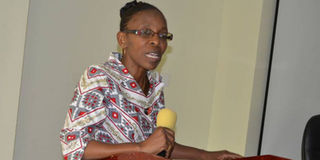Inadequate vocational centres cited hindrance for women innovators

Deputy permanent secretary in the Ministry of Education Dr Ave Maria Semakafu
What you need to know:
- Deputy permanent secretary in the Ministry of Education Dr Ave Maria Semakafu said today March 7, 2018 that closing down of vocational schools in recent years has made the government not to succeed in science and technology.
Dar es Salaam. Lack of vocational education centres is cited as one of the factors that make the country to have few female innovators.
Deputy permanent secretary in the Ministry of Education Dr Ave Maria Semakafu said today March 7, 2018 that closing down of vocational schools in recent years has made the government not to succeed in science and technology.
She was speaking at an event organised to mark the International Women’s Day which is celebrated every year on March 8.
Themed “Press for Progress: Women and Innovation,” the event showcased the work of Tanzanian innovators and entrepreneurs supported by the Human Development Innovation Fund (HDIF).
“Education is everyone’s right and that is why we have made a progress in enrolment of school children. Unfortunately, when it comes to science and technology the initiatives are implemented at higher educational levels, leaving young innovators behind,” she said.
She further explained that to be an industrialized country, the government was currently in the final stage to renovate secondary and vocational schools so that everyone should participate in innovative system.
UK Department for International Development’s (DFID) representative Ms Jane Miller said that the UK government was putting girls and women at the center of their development effort.
“UK has so far supported 5.3 million girls in primary and secondary education, helped save the lives of 103,000 women in pregnancy and childbirth, improved access to financial services for over 36 million women and enabled nine million additional women access to family planning,” she said.
Apart from that, Ms Miller said that to support innovation in the country they have invested Sh111. 9 billion (39 million pounds)through HDIF to support innovations that have potential to create social impact in education, water, sanitation and hygiene.




